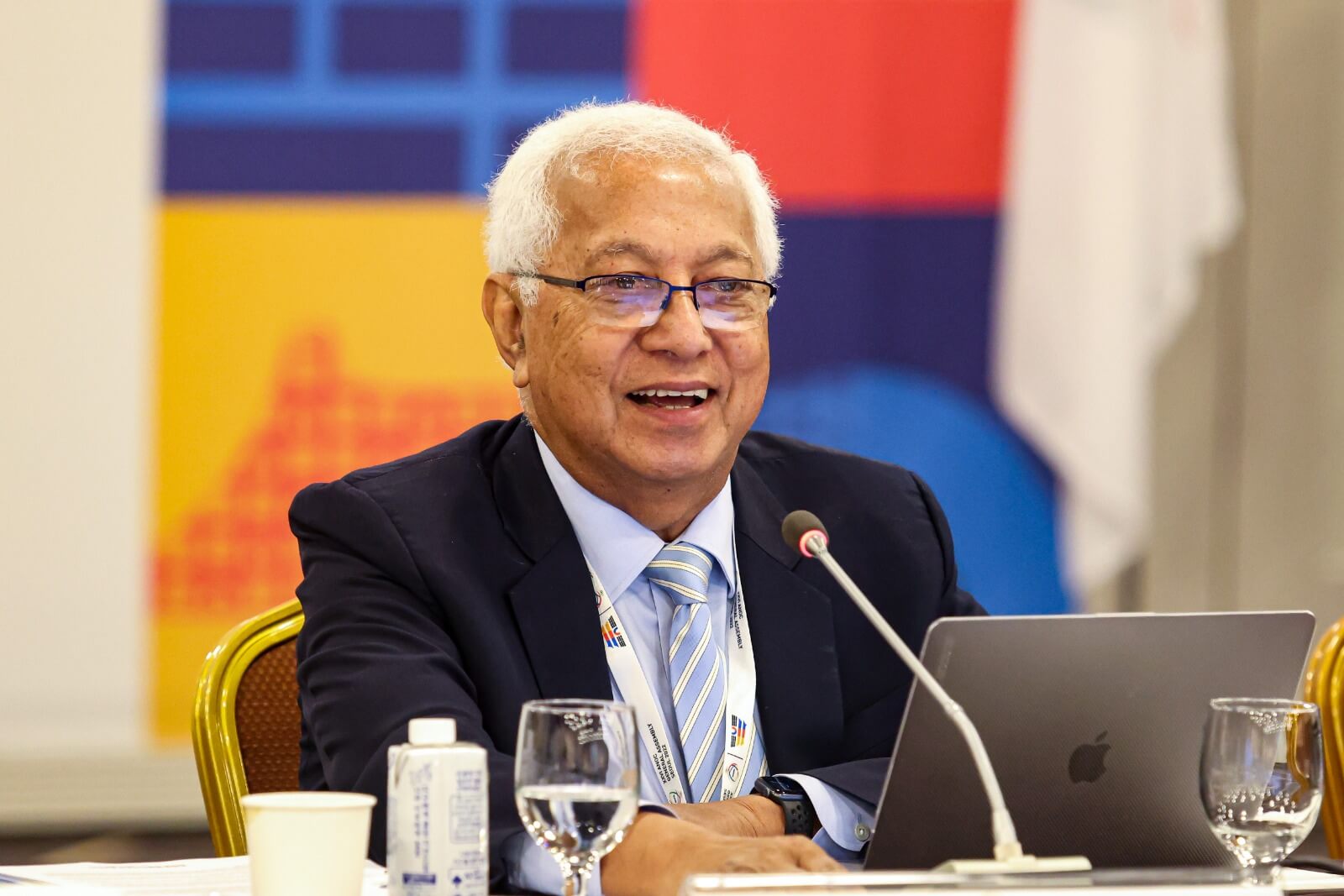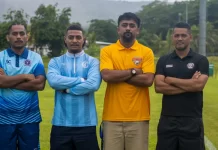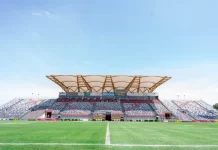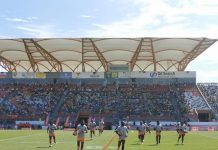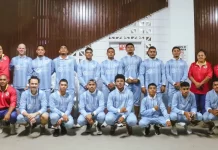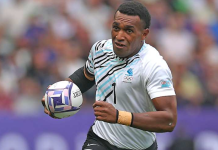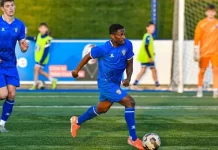Athletes and para-athletes of Oceania can expect a decade of change that increases their chances at growing through access to high performance, and winning medals as the Oceania National Olympic Committees (ONOC) propel the Continent into a new, high-level set of partnerships and initiatives culminating with the Brisbane 2032 Olympic and Paralympic Games – the second Games to be hosted by Australia, and arguably the first to be “co-hosted and celebrated” by a Continent, Oceania.
Reporting at the 43rd ONOC General Assembly held in Brisbane on 21 April, President Robin Mitchell shared several high-level success items.
These include the establishment and growth of the ONOC Brisbane 2032 Programme through strengthened existing, and new partnerships; extension and connection to the United Nations (UN) Sustainable Development Goals (SDGs); the highest uptake of Olympic Scholarships by Pacific Islands’ athletes; Regional Training Centres (RTCs) for various sport in the islands; and ONOC’s most important decision on partners translating the ground-breaking partnership with the Oceania Paralympic Committee (OPC).
The ONOC Brisbane 2032 Programme a call to action
The 43rd ONOC General Assembly will be remembered as the assembly that formally recognised and gathered all partners in a single vision toward making the Brisbane Olympic and Paralympic Games as the games for “All Oceania”.
It will also be remembered for what President of the OPC Paul Bird earlier in the week cited as the ONOC-OPC partnership celebrating “full integration and inclusion”.
This iteration of the General Assembly used the ONOC Brisbane 2032 Programme as a thread to weave together partnerships, relationships, science, high performance, games schedules, a troubled world at greater risk with climate change impacts, the UN Sustainable Development Goals – becoming a flagship theme.
President Mitchell shared that less than two months after Brisbane was announced as the Host of the 2032 Olympic and Paralympic Games, ONOC set up an Australia-based B2032 team comprising Kevan Gosper, President of the Organisation of Sports Federations of Oceania (OSFO); Andrew Minogue, Chief Executive Officer of the Pacific Games Council (PGC); and Atma Maharaj (ONOC B2032 Coordination Consultant).
President Mitchell said “the ONOC Brisbane 2032 Programme was announced on 23 July 2022, exactly ten years to the Opening of the 2032 Games.”
Following this, ONOC worked with the Australia-based team to broker new relationships within Australia and in New Zealand.
President Mitchell added that ONOC’s “existing partners in Australia include the Organisation of Sports Federations of Oceania (OSFO), Pacific Games Council (PGC), Oceania Australia Foundation (OAF), and ONOC member the Australian Olympic Committee (AOC).
“ONOC’s new partner is the Oceania Paralympic Committee.
“ONOC has engaged in deep consultations and information sharing with all partners and with Australia’s Department of Foreign Affairs and Trade, DFAT – within that we also met with the Office of the Pacific.
“We have also built a stronger relationship with our ONOC member, the New Zealand Olympic Committee, NZOC, and met with the Ministry of Foreign Affairs and Trade, MFAT, and Sport New Zealand.”
President Mitchell said, “all member National Olympic Committees (NOCs), National Paralympic Committees (NPCs) and the B2032 Organising Committee were consulted.”
As was seen during the week of the General Assembly, growing relationships extend to the Australian Institute of Sport (AIS), Queensland State Government, Brisbane City Council, and to academic institutions in Queensland such as Griffith University and others in Australia.
These existing and growing partnerships will propel the ONOC Brisbane 2032 Programme ensuring Pacific Island athletes may access long-term athlete development programmes through talent identification and maintenance, and high performance for both coaches and athletes in order improve island-based athletes chances at winning medals at Brisbane 2032, and potentially, on the road to 2032.
The ground-breaking ONOC and Oceania Paralympic Committee (OPC) partnership
President Mitchell said, “One of the most important decisions ONOC made was to work with the Oceania Paralympics Committee (OPC).”
It is the first time that the Oceania Continent is working with its Paralympic counterpart and this began in 2022, and will in its first iteration, go to B2032 , then beyond – a remarkable feat and opportunity that stands to benefit athletes and para-athletes.
Echoing President Mitchell’s statement on consultations with all partners, President of the Oceania Paralympic Committee, Paul Bird, had earlier in the week paid tribute to the genuine sense of partnership extended by ONOC.
OPC President Paul Bird said, “our [Oceania Paralympic] team met with you in Nadi [Fiji in 2022] and felt for the first time a real sense of inclusion with you, the ONOC family.
“There was open dialogue between National Olympic Committees [NOCs] and National Paralympic Committees [NPCs] that has never taken place before, as well as a real sense of inclusion with the development of the ONOC [Brisbane 2032] Strategy.
“OPC was invited to be a real partner with the [Brisbane 2032] Strategy.”
President Mitchell acknowledged the presence of Duane Kale, Vice-President of the International Paralympic Committee and OPC President Paul Bird.
NOCs encouraged to use backlog of Olympic Solidarity funding
President Mitchell encouraged all member NOCs to access and use the backlog of Olympic Solidarity funding that was available to all members, noting that it was particularly important for athletes qualifiers toward PARIS 2024.
President Mitchell said, “The backlog was created in the two years of the global COVID-19 pandemic.
“We must also note that five countries in Oceania came out of COVID-19 in November and December last year [2022] so there is a lag in access and use of funding and we will have to work very hard to qualify for PARIS 2024.
President Mitchell reiterated that the focus by NOCs should be in qualifiers and competitions.
Increase in uptake of Olympic scholarships by athletes from Pacific Islands
Athletes from the Pacific Islands have historically accessed Olympic scholarships for athletes at lower rates than Australia and New Zealand, and where accessed, there have been mixed results.
President Mitchell was pleased to announce that “a total of 75 Olympic scholarships were awarded to Pacific Island athletes to date.
“Of these, 42 are male athletes and 33 female, which is a huge change from previous years in that more female athletes are being nominated and performing at a high level.
The 75 scholarships have been awarded in the following sports: Weightlifting, Athletics, Swimming, Boxing, Wrestling, Judo, canoeing, Surfing, Taekwondo, Golf, Sailing, Triathlon, and Table Tennis.
Regional Training Centres for various sport in the Pacific Islands
President Mitchell announced that it was good that member NOCs were using the Samoan Weightlifting Centre for the training of their weightlifters.
President Mitchell said, “There are a few more regional training centres coming up in the next year and this includes one for Beach Volleyball, and potentially another for Martial Arts in Guam.
“Currently, our martial arts athletes [Judo, Wrestling, Taekwondo] go for training in Korea, China, and Japan but if Guam becomes a regional training centre, more athletes could attend.
“The Regional Training Centres will allow us to bring our athletes and coaches to the level where they can make use of the high-performance areas in Queensland, wider Australia, and New Zealand generally.”
ONOC working on IOC Sport and the UN Sustainable Development Goals – Recommendation 10 of the Olympic Agenda 2020+5
President Mitchell also underscored the significance of ONOC re-extending its links to the Pacific Islands Forum Secretariat (PIFS) – the Forum being the highest political body incorporating the Leaders (Presidents and Prime Ministers) of Pacific Island Countries.
President Mitchell said, “ONOC’s work with the SDGs is led by the International Relations Commission, which is chaired by Baklai Temengil, who as a former Palau Government minister, chaired the Pacific Regional Sport Taskforce (PRST) and its work in developing the Pacific Sport, Physical Activity and Physical Education (SPAPE) Action Plan 2019 – 2030 which offers a regional coordination mechanism for sport, physical activity and physical education in Oceania.
“Our work in sport contributing to the SDGs stems from the formalisation of the International Olympic Committee [IOC] and UN partnership underscored by IOC President Thomas Bach addressing the UN General Assembly in 2015, stressing the importance of sport as an important enabler of the SDGs.”
The IOC gained Observer Status at the UN in 2009 and has since supported its role as a champion of sport and its contributions toward peace, health, education, gender equality, violence against women, decent work and economic growth, innovation, poverty alleviation, reduced inequality, employment, youth development, diversity, social inclusion, environment, and climate action, among other development agenda.
President Mitchell said that ONOC was based at the PIFS headquarters for ten years where it saw the relationship between politics and sport – thereby informing ONOC’s decision and action to partner with PIFS and UNESCO in the PRST and SPAPE engagement which among other ongoing items, endorsed having all Pacific island countries having a National Sport Policy.
The rekindling of the ONOC-PIFS partnership will see a closer and more evidence-based collaboration between the two regional organisations across the decade and toward the PIF 2050 Blue Pacific Strategy as sport data, information, and initiatives are captured to contribute to SDG-reporting at national and regional levels.
Launching our New Series
Our TRANSFORMING OCEANIA SPORT SERIES running from 8 – 31 May 2023 brings you the strategic discussions, headline decisions, inspirational organisations and people that featured at our pre-AGA ONOC Brisbane 2032 Step-Up Oceania Conference, the Sport and Sustainable Development Goals meeting, and the Olympic Solidarity Highlights.
SOURCE: ONOC MEDIA/PACNEWS






